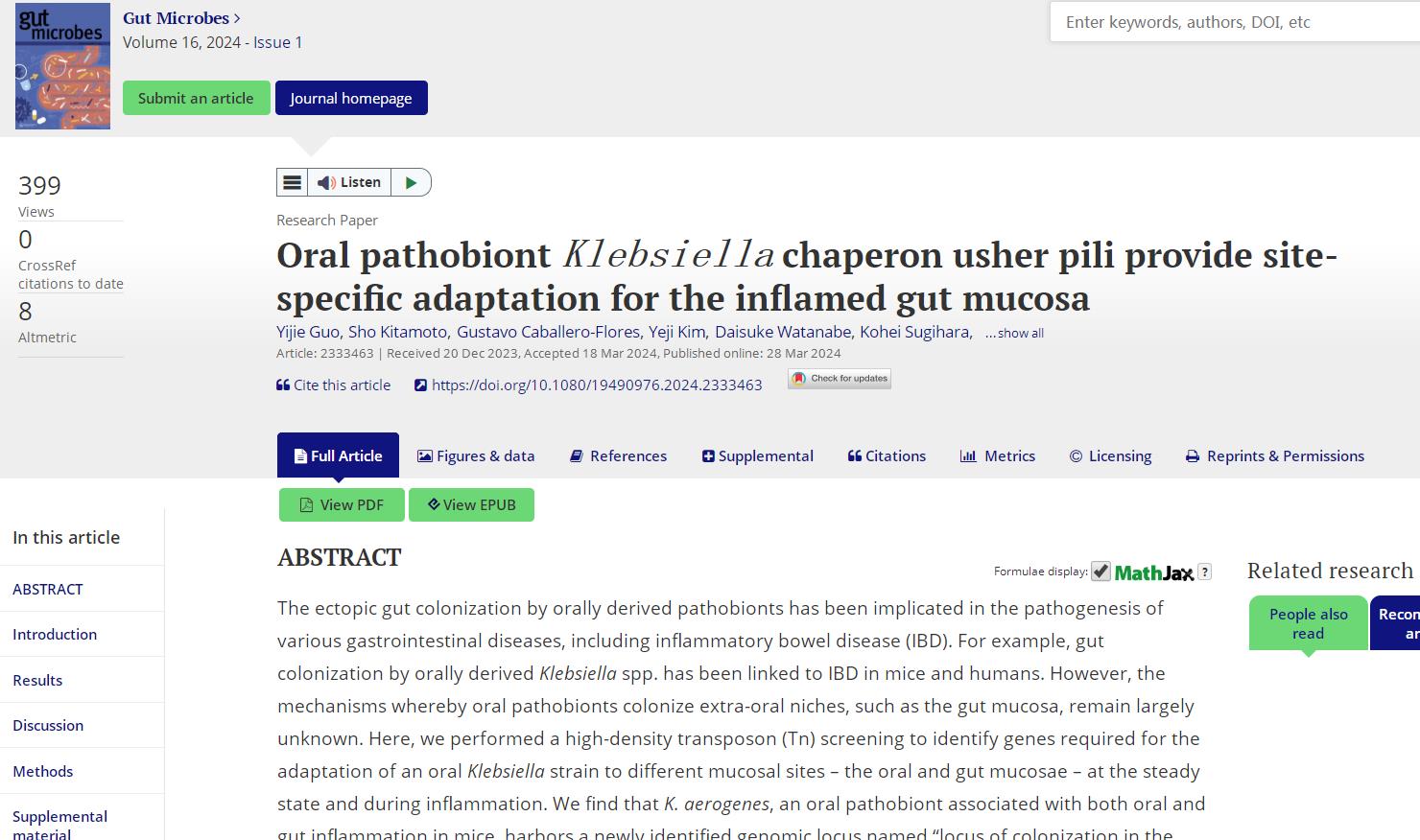On March 28, 2024, Associate Researcher Guo Yijie from Professor Ma Xiancang’s team in Department of Psychiatry of the First Affiliated Hospital (FAH) of Xi'an Jiaotong University (XJTU) and Professor Nobuhiko Kamada from Division of Gastroenterology and Hepatology of University of Michigan in USA jointly published the latest research achievement as an Article entitled “Oral pathobiont Klebsiella chaperon usher pili provide site-specific adaptation for the inflamed gut mucosa” in Gut Microbes (IF:12.2), a prestigious journal in the field of microbiology.
Relevant research on the pathogenesis of inflammatory bowel disease (IBD) remains to be improved, especially the "oral-gut" axis, as a new research direction, remains largely unknown. Therefore, the team targeted at oral pathobionts, conducted in-depth study of the adaptive mechanism of ectopic colonization by orally derived pathobionts, aiming to provide valuable insights and research basis for alleviating digestive tract diseases by treating oral diseases.

Clinical studies have proven that the abnormality of local oral microenvironment can promote the incidence of gut inflammation. As early as 2020, Professor Nobuhiko Kamada’ team has discovered for the first time that orally derived Klebsiella bacteria can colonize the guts of mice and humans, and aggravate the progression of IBD. However, the mechanism underlying ectopic colonization by oral pathobionts (such as the gut mucosa) remains elusive. Considering different microenvironments between oral and gut mucosa, oral pathobionts may adopt different strategies to colonize in their original niche (i.e., the oral mucosa) and ectopic niche (i.e., the gut mucosa).
In this study, the research team conducted high-density transposon (Tn) screening to identify genes required for the adaptation of an oral Klebsiella strain to different mucosal sites (the oral and gut mucosae) at the steady state and during inflammation. They found that K.aerogenes, an oral pathobiont related to both oral and gut inflammation in mice, harbors a newly identified genomic locus named " locus of colonization in the inflamed gut (LIG)" that encodes genes related to iron acquisition (Sit and Chu) and host adhesion (chaperon usher pili [CUP] system). The LIG locus is highly conserved among K. aerogenes strains, and these genes are also present in several other Klebsiella species. The Tn screening revealed that the LIG locus is required for the adaptation of K. aerogenes in its ectopic niche. In particular, they determined K. aerogenes employs a CUP system (CUP1) present in the LIG locus for colonization in the inflamed gut, but not in the oral mucosa. Thus, oral pathobionts likely exploit distinct adaptation mechanisms in their ectopically colonized intestinal niche compared to their native niche.
Department of Psychiatry and Center for Brain Science of FAH of XJTU is the first affiliation. Associate Researcher Guo Yijie is the first author. Professor Nobuhiko Kamada from the University of Michigan is the corresponding author of this article. This study was supported by National Natural Science Foundation of China, National Institutes of Health grants and Crohn’s & Colitis Foundation Research Fellowship Award.
Article link:https://doi.org/10.1080/19490976.2024.2333463